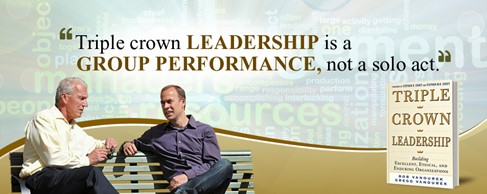Here are three critical questions to ask yourself before you undertake the responsibility of leading other people:
1. What’s the difference between “the leader” and “leadership”?
“The leader” is the historical leadership model that has led us astray so often. It focuses on the skills, attributes, and qualities of the “the leader.” It tells us what each of us must do to become a leader: be more decisive, have a vision, know the answers, demonstrate charisma, and more.
There’s much value here, but it causes trouble when it locks in the assumption there can only be one leader. Of course, having multiple leaders on the same task at the same time would be chaotic.
But the world is complex. Even within a hierarchy, different people can lead different things at different times, and that’s the best way to create a high-performance team: let others lead, unleash them, and coach them in the process.
The most effective leaders today don’t just need loyal followers, as important as they may be. The complexity and pace of today’s world demand leaders at every level, voices at every meeting that collaboratively challenge the way forward, and volunteers to undertake essential projects.
The wise leader knows when to lead and when to let others lead. It’s not all about “the leader.” It’s about the numerous leaders, who are constantly stepping up and stepping back to lead or let others lead. That’s the essence of a high-performance team. “Leadership,” not “the leader.”

2. Why do you want to lead?
Is it for the title, the money, the prestige, the power, the perquisites, or the authority? Is it to prove something to someone, a parent, friend, or someone you want to impress?
Any of these reasons will lead to disaster. People will recognize these motives. Seeing it’s all about you will turn them off. Without them as loyal, committed followers, or without them as unleashed leaders dedicated to helping you achieve your collective goals, you will fail.
As Robert Greenleaf, founder of the Greenleaf Center for Servant Leadership, sagely observed decades ago, the best leaders serve. People sense that service. Then they commit. Then they follow. Then they help you lead. Leaders serve. All of which brings us to our last critical question.

Leadership Derailers Assessment
Take this assessment to identify what’s inhibiting your leadership effectiveness. It will help you develop self-awareness and identify ways to improve your leadership.
3. Whom do you serve?
If you are serving your ego, you will fail as a leader.
Leaders serve their followers and, collectively, the organization serves its multiple stakeholders: customers, employees, vendors and partners, the community, and its owners (for a nonprofit, substitute stakeholders like donors, recipients, etc.).
The days of any organization serving only shareholders, often at the expense of other stakeholders, will hopefully be over soon. The stakeholders not well served will abandon you. Leaders serve their followers and key stakeholders.
How do you answer the most important questions about your leadership?
Tools for You
- Leadership Derailers Assessment to help you identify what’s inhibiting your leadership effectiveness
- Personal Values Exercise to help you determine and clarify what’s most important to you
- Alignment Scorecard to help you assess your organization’s level of alignment
Related Articles

Triple Crown Leadership Newsletter
Join our community. Sign up now and get our monthly inspirations (new articles, announcements, opportunities, resources, and more). Welcome!
+++++++++++++++++++++++
Gregg Vanourek and Bob Vanourek are leadership practitioners, teachers, and award-winning authors (and son and father). They are co-authors of Triple Crown Leadership: Building Excellent, Ethical, and Enduring Organizations, a winner of the International Book Awards. Check out their Leadership Derailers Assessment or get their monthly newsletter. If you found value in this, please forward it to a friend. Every little bit helps!

